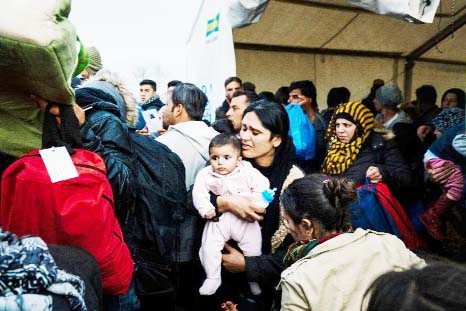
AFP, Brussels :
European Union leaders will on Monday back closing down the Balkans route used by most migrants to reach Europe, diplomats said, after at least 25 more people drowned trying to cross the Aegean Sea en route to Greece.
The declaration drafted by EU ambassadors Sunday will be announced at a summit in Brussels on Monday, set to also be attended by Turkish Prime Minister Ahmet Davutoglu.
The bloc’s 28 leaders will ask Davutoglu’s government to accept “large-scale” deportations of economic migrants from Greece, the main entry point to Europe, and do more to implement a November deal to slow the flow of people into the bloc.
Greece has seen non-EU Macedonia and EU countries on the western Balkans route virtually shut their borders in a domino effect, trapping Syrian and other asylum seekers desperate to head north to wealthy Germany and Scandinavia.
An EU diplomat told journalists that European leaders would declare Monday they will “close the Balkans route in the coming days,” ending the “wave-through approach” to migrants that has caused chaos and tension in Europe.
Another diplomat confirmed that the language contained in an earlier draft declaration remained: “Irregular flows of migrants along the western Balkans route are coming to an end”.
The diplomat cautioned that delegations were still looking at the draft, as is always the case before a summit.
Brussels on Friday unveiled a plan to restore by the end of the year the full functioning of Europe’s cherished passport-free Schengen zone after the series of border closures.
It was timed with calls for not only better cooperation from Turkey but also the creation of an EU coastguard force by the summer and help for Greece to strengthen its external border.
EU leaders are set to stand by Greece after having last week promised 700 million euros in emergency aid for the country and other states to help them manage the influx at their borders.
Greek Prime Minister Alexis Tsipras on Sunday demanded the “urgent” relocation of thousands of refugees to other member states.
The bloc adopted a scheme last September to relocate 160,000 asylum seekers from Greece and Italy, but fewer than 700 people have actually been moved.
Donald Tusk, the European Council president and summit host, said in his invitation letter that success depended largely on securing Turkey’s agreement for the “large-scale” readmission from Greece of economic migrants who do not qualify as refugees.
Syrians, who top the influx of people into Europe, are considered genuine refugees requiring admission under international law. Davutoglu told reporters at Istanbul airport before leaving for Brussels that Turkey had taken “important steps” to fulfil its part of the stalled November deal.
European Union leaders will on Monday back closing down the Balkans route used by most migrants to reach Europe, diplomats said, after at least 25 more people drowned trying to cross the Aegean Sea en route to Greece.
The declaration drafted by EU ambassadors Sunday will be announced at a summit in Brussels on Monday, set to also be attended by Turkish Prime Minister Ahmet Davutoglu.
The bloc’s 28 leaders will ask Davutoglu’s government to accept “large-scale” deportations of economic migrants from Greece, the main entry point to Europe, and do more to implement a November deal to slow the flow of people into the bloc.
Greece has seen non-EU Macedonia and EU countries on the western Balkans route virtually shut their borders in a domino effect, trapping Syrian and other asylum seekers desperate to head north to wealthy Germany and Scandinavia.
An EU diplomat told journalists that European leaders would declare Monday they will “close the Balkans route in the coming days,” ending the “wave-through approach” to migrants that has caused chaos and tension in Europe.
Another diplomat confirmed that the language contained in an earlier draft declaration remained: “Irregular flows of migrants along the western Balkans route are coming to an end”.
The diplomat cautioned that delegations were still looking at the draft, as is always the case before a summit.
Brussels on Friday unveiled a plan to restore by the end of the year the full functioning of Europe’s cherished passport-free Schengen zone after the series of border closures.
It was timed with calls for not only better cooperation from Turkey but also the creation of an EU coastguard force by the summer and help for Greece to strengthen its external border.
EU leaders are set to stand by Greece after having last week promised 700 million euros in emergency aid for the country and other states to help them manage the influx at their borders.
Greek Prime Minister Alexis Tsipras on Sunday demanded the “urgent” relocation of thousands of refugees to other member states.
The bloc adopted a scheme last September to relocate 160,000 asylum seekers from Greece and Italy, but fewer than 700 people have actually been moved.
Donald Tusk, the European Council president and summit host, said in his invitation letter that success depended largely on securing Turkey’s agreement for the “large-scale” readmission from Greece of economic migrants who do not qualify as refugees.
Syrians, who top the influx of people into Europe, are considered genuine refugees requiring admission under international law. Davutoglu told reporters at Istanbul airport before leaving for Brussels that Turkey had taken “important steps” to fulfil its part of the stalled November deal.

